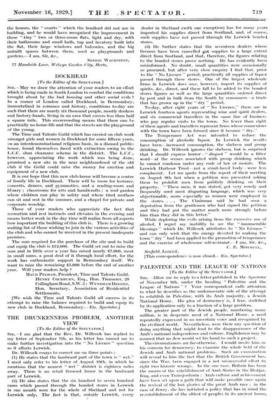THE DRUNKENNESS PROBLEM, ANOTHER VIEW [To the Editor of the
SPECTATOR.] SIR,--I am glad that the Rev. Dr. Willcock has replied to my letter of September 7th, as his letter has caused me to make further investigation into the " No Licence " question as it affects Lerwick.
Dr. Willcoek essays to correct me on three points : (1) He• states that the landward part of the town is " wet." I need only refer to his letter of August 10th, in which he mentions that the nearest " wet " district is eighteen miles away. There is no retail licensed house in the landward part of Lerwick.
(2) He also states that the six hundred to seven hundred eases which passed through the bonded stores in Lerwick in one month were for the whole of. Shetland and not for -Lerwick only. The .fact is that, _outside Lerwick, every
dealer in Shetland (with one exception) has for many years imported his supplies direct from Scotland, and, of course, such supplies have not passed through the Lerwick bonded stores.
(3) He further states that the seventeen dealers whose licences have been cancelled got supplies to a large extent direct from Scotland, and that, therefore, the figures relating to the bonded stores prove nothing. He has evidently been misinformed. No doubt, small quantities were occasionally so procured, but after very close enquiry I find that, prior to the " No Licence " period, practically all supplies of liquor passed through these stores. One of the largest wholesale firms in Lerwick does now, however, import its supplies of spirits, &c., direct, and these fall to be added to the bonded stores figures as well as the large quantities ordered direct by post and in bulk from the South by consumers--a trade that has grown up in the " dry " period.
To-day, after eight years of " No Licence," there are in Lerwick fourteen agents representing wine and spirit dealers, and six commercial travellers in the same line of business who pay regular visits to the town. No fewer than eight of these agents and travellers represent firms whose connexions with the town have been formed since it became •" dry."
The Temperance Act was intended to reduce the consumption of alcoholic liquor. In Lerwick the results have been—increased consumption, the shebeen and group drinking. Dr. Willcoek ignores the shebeen, but is surprised that I should express horror—" disgust " would be a litter word—at the scenes associated with group drinking which he cannot condemn under any code of law or more- ls. The Lerwick Harbour Trust—not a strait-laced body—were less complacent. Let me quote from the report of their meeting on August 9th last when a petition was presented asking them to prohibit men from publicly drinking on their property. " These men, it was stated, got very rowdy and frequently used most disgusting language, which was very objectionable, more especially as women were employed in the stores. . . . The Chairman said he had seen a deputation from the gentlemen who had signed the petition and they had put the matter much more strongly before him than they did in this letter."
While deploring the evils arising from the excessive use of alcohol, I regret my inability to see the " innumerable blessings " which Dr. Willcock attributes to " No Licence " and can only wish that the energy devoted to making the town " dry " had been applied to the promotion of temperance and the exercise of wholesome self-restraint.—I am, Sir, &c., C. E. MITCHELL, Seafield, Lerwick.
[This correspondence is now closed.— En. Spectator.]








































 Previous page
Previous page